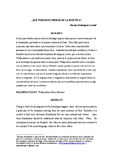¿Qué podemos esperar de la Bioética?
Abstract
Acudir para fundar juicios éticos al decálogo supone ideas que no acepta buena parte de la humanidad, partiendo de la misma existencia de Dios. Hace falta pues buscar cimientos más universales, más racionales y críticos. Sobre esos cimientos debe asentarse lo que la humanidad llama ética. Acabados los sistemas metafísicos, la ética o filosofía moral se ha reducido al análisis del lenguaje moral, que es la ética crítica.
Wittgenstein en una conferencia sobre ética, parte de la explicación de Moore: la ética es la investigación general sobre lo bueno pero Wittgenstein muestra todo lo complejo que es establecer eso bueno. Para el filósofo nuestra paradas expresan solo hechos y la ética, de ser algo, es sobrenatural. Analiza expresiones como bien absoluto y concluye que un característico mal uso de nuestro lenguaje subyace en todas las expresiones éticas y religiosas. En el lenguaje ético y religioso se usan símiles se impone buscar lo que está detrás del simil. La bioética debería salir de la metafísica para asentarla en algo
ceptable por todos los científicos.
Información Adicional
| ISSN | 2244-7482 |
| Resumen en otro Idioma | Trying to find ethical judgment to the Decalogue suggest ideas that are not accepted by a good part of the humanity, starting from the same existence of God. Therefore it is needed to find more universal foundations that are more rational and critical. Upon those foundations should be established what the humanity calls ethics. When the metaphysical systems are finished , the ethics or moral philosophy has been reduced to the analysis of the moral language, which is the critical ethics. Wittgenstein in an ethics conference, said as part of the explanation of Moore: ethics is the general investigation upon the good but Wittgenstein shows all the complexity of establishing of what is good. For the philosopher our position only it expresses facts and ethics, as been something supernatural. It analyzes expressions as absolute good and concludes that a bad use characteristic of our language is underlined in all ethics and religious expressions. Simile is used in our ethical and religious language which imposes us to seek for what is behind the simile. The Bioethics should stay out of metaphysics in order to become established into something acceptable for all scientists. |
| Descriptor Onomástico | Wittgenstein |
| Publicación Electrónica | Revista de Bioética Latinoamericana |
| Sección | Revista de Bioética Latinoamericana: Artículos |






